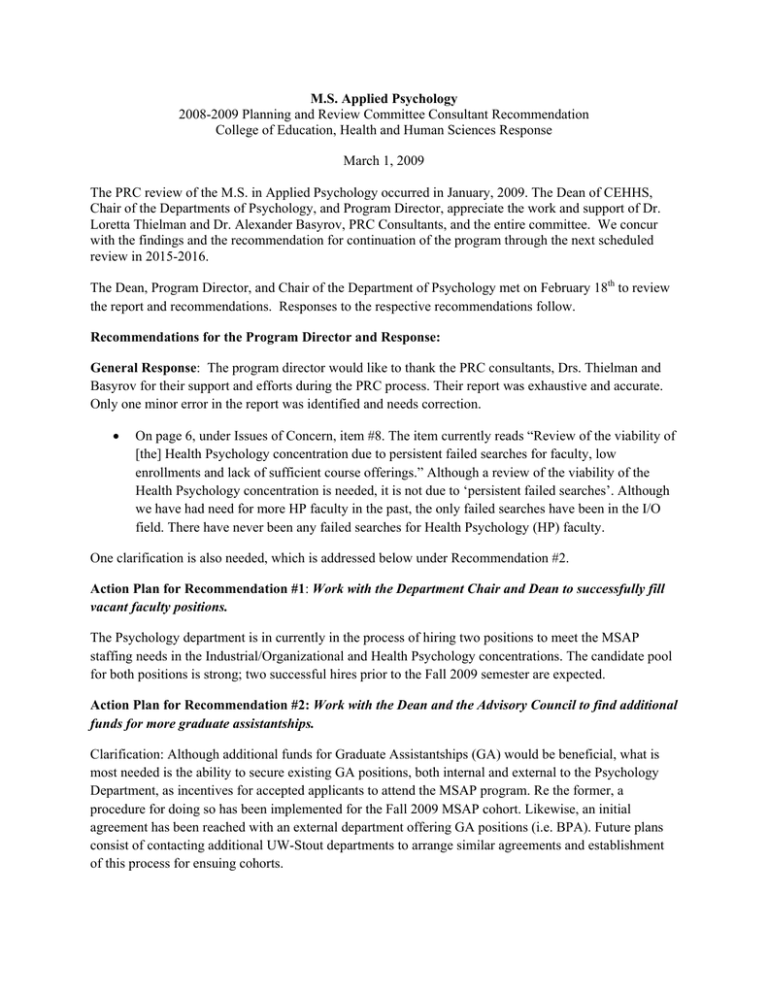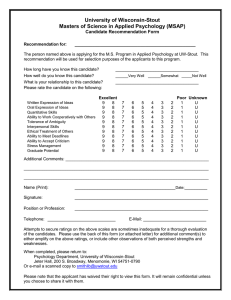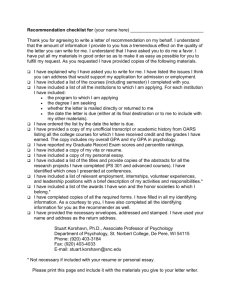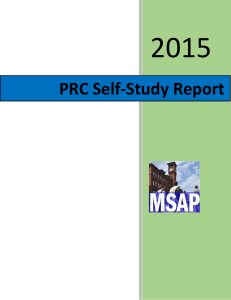M.S. Applied Psychology 2008-2009 Planning and Review Committee Consultant Recommendation
advertisement

M.S. Applied Psychology 2008-2009 Planning and Review Committee Consultant Recommendation College of Education, Health and Human Sciences Response March 1, 2009 The PRC review of the M.S. in Applied Psychology occurred in January, 2009. The Dean of CEHHS, Chair of the Departments of Psychology, and Program Director, appreciate the work and support of Dr. Loretta Thielman and Dr. Alexander Basyrov, PRC Consultants, and the entire committee. We concur with the findings and the recommendation for continuation of the program through the next scheduled review in 2015-2016. The Dean, Program Director, and Chair of the Department of Psychology met on February 18th to review the report and recommendations. Responses to the respective recommendations follow. Recommendations for the Program Director and Response: General Response: The program director would like to thank the PRC consultants, Drs. Thielman and Basyrov for their support and efforts during the PRC process. Their report was exhaustive and accurate. Only one minor error in the report was identified and needs correction. • On page 6, under Issues of Concern, item #8. The item currently reads “Review of the viability of [the] Health Psychology concentration due to persistent failed searches for faculty, low enrollments and lack of sufficient course offerings.” Although a review of the viability of the Health Psychology concentration is needed, it is not due to ‘persistent failed searches’. Although we have had need for more HP faculty in the past, the only failed searches have been in the I/O field. There have never been any failed searches for Health Psychology (HP) faculty. One clarification is also needed, which is addressed below under Recommendation #2. Action Plan for Recommendation #1: Work with the Department Chair and Dean to successfully fill vacant faculty positions. The Psychology department is in currently in the process of hiring two positions to meet the MSAP staffing needs in the Industrial/Organizational and Health Psychology concentrations. The candidate pool for both positions is strong; two successful hires prior to the Fall 2009 semester are expected. Action Plan for Recommendation #2: Work with the Dean and the Advisory Council to find additional funds for more graduate assistantships. Clarification: Although additional funds for Graduate Assistantships (GA) would be beneficial, what is most needed is the ability to secure existing GA positions, both internal and external to the Psychology Department, as incentives for accepted applicants to attend the MSAP program. Re the former, a procedure for doing so has been implemented for the Fall 2009 MSAP cohort. Likewise, an initial agreement has been reached with an external department offering GA positions (i.e. BPA). Future plans consist of contacting additional UW-Stout departments to arrange similar agreements and establishment of this process for ensuing cohorts. Action Plan for Recommendation #3: Work with the Dean and Advisory Committee to review and revise the admission requirements. Procedures and policy changes for ensuring selection of the best qualified MSAP student applicants have been discussed with the MSAP core faculty and Advisory Committee, and when appropriate voted into acceptance by the latter body. Many of these procedures were implemented during the applicant review and selection meeting for the Fall 2009 student cohort (e.g. requiring clarifying information from applicants for applicants meeting minimal admittance requirements; increased number of applicant reviewers, including PAC members and current students). Additional procedures/policy changes are to be implemented during the Fall 2010 cohort applicant review process (e.g. requiring Graduate Record Exam scores; recruiting of stronger candidates through purchasing of GRE examinee lists). Action Plan for Recommendation #4: Work with the Dean and Advisory Committee on student and faculty recruitment strategies. Student Recruitment: Various student recruiting strategies have been identified, developed, and as temporally appropriate, implemented. Many of these strategies were presented to and endorsed during the November, 2008 PAC meeting. Additional strategies in development since the November meeting will be presented to the PAC during the May, 2009 meeting. Examples of such strategies include • Enhanced web-design and development through participation in the Graduate School WebRedesign Pilot Program • Purchasing of GRE lists • Increased personal contact of every MSAP inquiring individual • Establishment of a formal semi-automated process for timely communication with student applicants and prospective students • Networking with program directors of Midwestern University and Colleges and MSAP related professionals • Allocation of GA funds as incentives for attendance. Faculty Recruitment: Indirect means of faculty recruitment have also been implemented. These consist of the policies and procedures discussed under recommendation #3 (admission requirements) and above mentioned student recruitment strategies. Through these means, both the actual and perceived caliber of the MSAP program should be enhanced. The expected impact is increased attractiveness of the MSAP program by future faculty applicants. To help secure a successful I/O faculty search, conversations with the Chair and Dean regarding appropriate competitive salaries commensurate with I/O Psychologists in Business Schools will occur as appropriate. Action Plan for Recommendation #5: Work to improve student access to computers, statistical software and technical support and to provide training as needed. Laptop access: During the November, 2008 PAC meeting, a motion to require incoming students to have personal computers with required software platforms was unanimously passed. Efforts are now needed to identify this platform and implement it for the Fall 2009 semester. Technical support: Once the required platform is identified, technical support discussions with ASK 5000 and other campus appropriate personnel will occur. In addition, specialized training for some software packages (e.g. Excel advanced statistics, Microsoft Access, Qualitative Packages) will be requested of the appropriate campus resources. Action Plan for Recommendation #6: Work with the Chairs of the Psychology and Math, Stat and C.S. Departments to develop and/or revise courses in Statistical Analysis and Health Psychology. Statistical Analysis: Discussion amongst core MSAP faculty and PAC has occurred. All are in agreement that a graduate level Social Science statistical course is needed. Specific curriculum coverage has been identified. Discussions with the Math and Statistics department need to occur, to assess their interest in course development and willingness/commitment to offer the course once each Fall semester. The option of developing the course using statistical expertise of Psychology faculty is also being explored. Health Psychology: See response to recommendation #9 below. Action Plan for Recommendation #7: Work to clarify program requirements and expectations to students. Procedures have been implemented to clarify program requirements and expectations to students. Examples include: • Mandatory student (re)orientation meetings scheduled at the beginning of each semester, as appropriate. • Increased time during the seminar class allotted to assisting students with Graduate School paperwork, discussion of program expectations and key milestones, and a weekly forum for students to voice program related questions • To increase students’ awareness of his/her progress during the program and future performance expectations, a mid-program review was implemented in Fall 2009. This process entails core MSAP faculty formally meeting to discuss relevant students’ academic and professional progress/development, distribution of the findings in written reports to each student under review, and a formal meeting of the student and reviewing MSAP faculty. • To help students quickly locate key forms and other related documents, web-page redesign is underway. • To assist all core MSAP faculty members in their awareness of student concerns or issues, approximately bi-weekly meetings of the core MSAP faculty occur. During these meetings, individual faculty can bring forward specific student issues for discussion, faculty can discuss needed intervention/ resolution plans, and identify means for student dissemination of appropriate information. Action Plan for Recommendation #8: Work on increasing your availability to students. To address the perceived need by some students for greater program director availability, the following has occurred. • By hiring of an additional MSAP core faculty member (Dr. Staggs, Fall 2008), a 50% increase in MSAP core faculty occurred. This has effectively allowed students greater access to PD time for PD related needs (e.g. signatures, class advising) as it has reduced overall PD time demands from students for thesis advisement, emotional support, and various miscellaneous students needs (e.g. letters of recommendations, career mentoring). • Fall 2008 discussed in detail with students the various options for contacting the PD; re-addressed during Spring 09 reorientation meeting. • Individual student and PD meetings are scheduled each semester to discuss issues, career development, and plans/timeline for program completion. • Increased office presence in addition to scheduled office hours, with increased availability earlier and later in the day. Action Plan for Recommendation #9: Work with the Dean and Advisory Committee to review the viability of the Health Psychology concentration. The Health Psychology (HP) concentration has historically had low enrollments. One etiologic factor for this has been the lack of an applied intervention focus of the MSAP HP curriculum. Instead, the curriculum has been focused on applied research in the health profession. Many students who contact the PD regarding the concentration are seeking intervention training in addition to applied research. To provide students in the Health Psychology concentration such training, program/ curriculum revision is required. Specifically, curriculum in Health Promotion, Health Education, and/or Public Health could be added. Doing so would provide students some of the didactic and experiential training needed for professional certification/ recognition in these fields. Further, it aligns with the purpose and mission statement of the newly formed College of Education, Health and Human Sciences, as well as existing and prospective HP students’ career interests, U.S. labor statistic projections, and local market demands 1 . In order to explore the viability of revising the HP concentration curriculum to meet some of the educational standards in these fields, an exhaustive study and analysis is to occur. • As appropriate, Curriculum Incubation Grant(s) will be submitted. • Investigations into the extent the current MSAP curriculum ‘maps’ onto required/ recommended educational training for Health Education and Public Health is underway. 1 Local market demands are based on informal conversations with a HR manager who hires for the fields under consideration. • Discussions with UW-Stout program directors regarding the use of existing non-Psychology courses by HP concentration students, as well as MSAP HP courses for their majors/minors will occur as appropriate. • Further investigation and documentation of student demand for such course work will occur. In addition to the above, focused recruiting efforts for Health Psychology concentration students will be undertaken in relation to the existing program (e.g. contact of GRE examinees with an interest in Health Psychology programs). Through the above efforts, increased student interest in the MSAP HP concentration is expected. Recommendations for the Chair of the Psychology Department and Response: 1. Work with the Program Director and the Dean in successfully filling vacant faculty positions. The Psychology Department is in the process of hiring faculty positions that support the MSAP. The Chair is very involved in that process. 2. Work with the Program Director on the development and revision of the needed courses. The Chair will work closely with the Program Director in development and revision of coursework. Additionally, the Chair will work with the Program Director on allocating recruitment funds for the Health Psychology concentration with a goal of increasing the fall 2009 cohort. Recommendations for the Dean of the College of Education, Health and Human Sciences and Response: 1. Work with the Program Director and the Chair to successfully fill vacant faculty positions. The Psychology Department is in the process of hiring two faculty positions that support the MSAP, specifically in the areas of Industrial/Organizational and Health Psychology. Candidates to be interviewed were selected from an excellent pool of applicants. It is anticipated that offers will be made by the end of the month. 2. Work with the Program Director to find additional funds for graduate assistantships. After conferring with the Chair and Program Director, it was determined that what is needed is to better use the existing GA allocations to recruit and retain highly qualified students. The Program Director will work with the Chair and other units that typically employ MSAP students as graduate assistants to recruit and select Graduate Students earlier. I will continue to assist the Programs in communicating GA position information across the College. My decision to expand the CEHHS Council to include Program Directors will enhance communication within the College. 3. Work with the Program Director and Advisory Committee to review and revise the admission requirements to the program. I am very supportive of the decision to phase in the Graduate Record Exam (GRE) requirement for admission. Other revisions to the admission procedures were implemented during the review and selection of the fall 2009 cohort as detailed in the Program Director response. Assessment reports and student profiles will be regularly reviewed to monitor the quality of students. 4. Work with the Program Director and Advisory Committee on student and faculty recruitment strategies. The vacant positions that are currently being recruited for are funded at the highest level possible given the resources of the College, but I will request supplementary support from the recruitment and retention funds or other sources if needed to attract the most qualified candidates. The Graduate School is providing support to enhance graduate program web-designs. The Graduate School has annually provided financial support for a variety of recruitment strategies. I will continue to encourage the Program Director to utilize this support as well as supporting professional development on recruitment strategies, collaboration with other graduate program directors, recruitment from appropriate undergraduate programs at UW-Stout, and attendance at appropriate recruitment activities such as research consortiums and graduate college recruitment fairs. The changes to the admission requirements and process are expected to enhance the reputation of the program and result in an even higher caliber of applicants. 5. Work with the Program Director and Advisory Committee to review the viability of Health Psychology concentration. I will continue to monitor the enrollment in the Health Psychology concentration. The Program Director and Advisory Committee will review the concentration and explore the possibility of revising the curriculum to have more of a focus on health intervention. Such a revision would be compatible with an increased emphasis on health intervention at the undergraduate level. A proposal to request permission to plan an undergraduate program in Health and Fitness is in development. I will support the Program Director in applying for a Curriculum Incubation grant to support an analysis and possible revision of the Concentration and will explore funding possibilities at the College level if the proposal is not supported at the university level.





